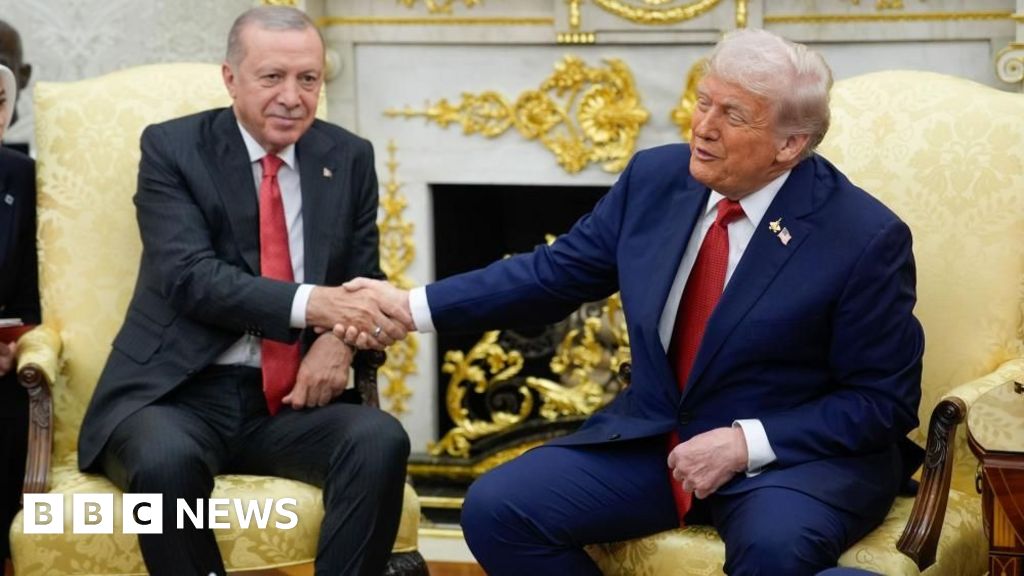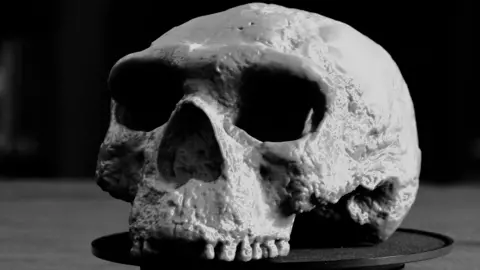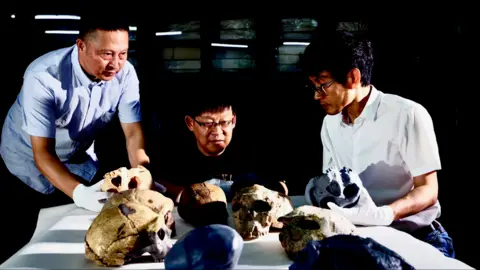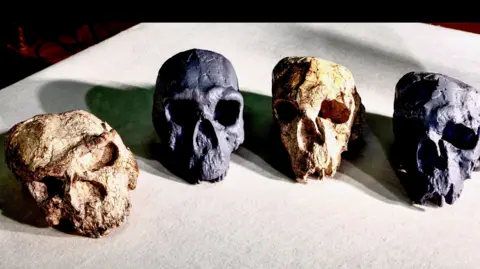Business
Trump urges Turkey to stop buying Russian oil as Erdogan chases deal on F-35s

Read full article on post.
US President Donald Trump has urged Turkey to stop buying oil from Russia, part of a wider drive to cut off Moscow’s energy funding as the war in Ukraine rages on.
Speaking alongside President Recep Tayyip Erdogan at the White House, Trump said halting those imports would be “the best thing” his Turkish counterpart could do.
The Oval Office meeting ended without any firm commitments to lift US sanctions on Turkey or sell advanced F-35 fighter jets, although Trump expressed optimism about both issues.
Turkey has for years been prevented from buying US F-35s. In 2019 it was expelled from a programme where it produced parts for the warplane after it acquired air defence systems from Russia.
During a brief question-and-answer session alongside Erdogan in the Oval Office on Thursday, Trump said he would like Turkey to stop “buying any oil from Russia while Russia continues its rampage against Ukraine”.
“The best thing he could do is not buy oil and gas from Russia,” Trump said. “If he did that, that would be the best thing.”
Trump added that he believes Erdogan is respected both by Ukrainian President Volodomyr Zelensky and Russian President Vladimir Putin, meaning that he could “have a big influence” on the war “if he wants to”.
Alongside India and China, Turkey is among Moscow’s biggest customers for oil and gas exports.
The US president’s comments come just weeks after he said he stood poised to impose tougher sanctions on Russia if Nato countries met conditions that included halting imports of Russian oil.
Earlier this week – during a lengthy speech at the UN General Assembly – Trump also accused Nato allies of “funding the war against themselves” through their purchases of energy from Moscow.
During Trump’s first term in office, the US removed Turkey from the F-35 programme after it purchased S-400 surface-to-air missile systems from Russia.
A US defence bill passed in 2020 included an amendment that prevented Turkey from acquiring F-35s, unless – and only if – the US government is able to certify that it has given up on the Russian S-400.
Some US lawmakers have expressed concerns about the potential sale over Turkish military incursions into Syria and past violations of Greek airspace.
Earlier this week, the bipartisan Hellenic Caucus in the US Congress warned against allowing Turkey to buy F-35s, citing its military co-operation with Russia and a “disregard for international norms and democratic principles”.
In the Oval Office, however, Trump told Erdogan that he would “be successful” with buying the things he would “like to buy”.
“He needs certain things, and we need certain things,” he said. “And we’re going to come to a conclusion. You’ll know by the end of the day.”
In an interview with Fox News this week, Erdogan said of the F-35 ban: “I don’t think it is very becoming of a strategic partnership.”
Trump also said that sanctions against Turkey – implemented in 2020 following the S-400 purchase – could be lifted “very soon”.
“If we have a good meeting, almost immediately”, he added.
Business
Former Arsenal striker dies after sustaining ‘significant injury’ during game

Read full article on post.
Chichester City FC and former Arsenal striker Billy Vigar has died after sustaining a “significant brain injury”.
Vigar, 21 and from Worthing, was injured during a game at Wingate and Finchley on Saturday in the Isthmian League Premier Division.
It is thought the injury was caused when he collided with a concrete wall, but the club has not confirmed this.
Vigar’s family said on Thursday they were “devastated that this has happened while he was playing the sport he loved”.
“After sustaining a significant brain injury last Saturday, Billy Vigar was put into an induced coma,” the family said.
“On Tuesday, he needed an operation to aid any chances of recovery. Although this helped, the injury proved too much for him and he passed away on Thursday morning.
“The responses to the original update show how much Billy was loved and thought of within the sport.”
Vigar was a graduate of the Arsenal academy and also had spells at Derby County, Hastings United and Eastbourne Borough.
Derby County said in a statement: “All at Derby County are deeply saddened by the passing of Billy Vigar.
“Billy spent the second half of the 2022-23 season with the academy on loan from Arsenal, making several appearances for the Under-21s.
“The thoughts of everyone at the club are with his family and friends at this incredibly difficult time.”
A spokesperson for Hastings said: “All of us at Hastings United are devastated to learn of the passing of Billy Vigar.
“We will always remember Billy’s time at Hastings United with fondness. Our thoughts are with Billy’s family [and] friends at this time.”
Vigar made 32 appearances for Eastbourne while on loan from Arsenal during the 2023-24 season.
Eastbourne said: “[We] are devastated to learn of the passing of former player Billy Vigar.
“Both footballing and non-footballing club staff are shocked and deeply saddened of the news, and our thoughts are with Billy’s family at this terrible time.”
The FA said in a statement: “We send our heartfelt condolences to his family, friends, loved ones and everyone at Chichester City FC at this incredibly difficult time.”
Breaking News
Irish Rail to remove gender titles from online train booking system

Read more on post .
People travelling on Irish Rail trains will no longer have to declare their gender when booking a seat online, the company has said.
The change is to come into effect in the coming months and follows feedback from the LGBTQ+ community on how gender is represented on Irish trains.
A survey was carried out by Irish Rail, in partnership with Belong To LGBTQ+ Youth Ireland, with a view to better understanding what mattered to these communities when travelling by train.
Sixty-eight adults took part, with more than half of the respondents identifying as gay, 27 per cent as bisexual, 12 per cent as lesbian, 16 per cent as transgender and 14 per cent as non-binary.
In response to the feedback from the survey, Irish Rail said it would remove all gender titles from its online booking system.
At present, passengers must select either Mr, Mrs or Ms as their title before entering their name when booking a ticket online. Now, they will just enter their name.
The survey was distributed on Irish Rail and Belong To online channels and was not run by an independent polling company.
As part of the survey, Irish Rail made a donation of €5,000 to the support group.
“This approach allowed Iarnród Éireann to gain meaningful insights into the experiences of LGBTQ+ rail users and directly contribute to the delivery of important services for the community,” an Irish Rail spokeswoman said.
Some 71 per cent of survey respondents said they feel safe most of the time as an LGBTQ+ person on public transport, with almost 40 per cent saying rail was more inclusive than other transport options.
More than one third of respondents said they had used trains to attend LGBTQ+ events such as Pride festivals.
Business
Million-year-old skull rewrites human evolution, scientists claim

Read more on post.
 BBC News
BBC NewsA million-year-old human skull found in China suggests that our species, Homo sapiens, began to emerge at least half a million years earlier than we thought, researchers are claiming in a new study.
It also shows that we co-existed with other sister species, including neanderthals, for much longer than we’ve come to believe, they say.
The scientists claim their analysis “totally changes” our understanding of human evolution and, if correct, it would certainly rewrite a key early chapter in our history.
But other experts in a field where disagreement over our emergence on the planet is rife, say that the new study’s conclusions are plausible but far from certain.
The discovery, published in one if the world’s leading scientific journals, Science, shocked the research team, which included scientists from a university in China and the UK’s Natural History Museum.
“From the very beginning, when we got the result, we thought it was unbelievable. How could that be so deep into the past?” said Prof Xijun Ni of Fudan University, who co-led the analysis.
“But we tested it again and again to test all the models, use all the methods, and we are now confident about the result, and we’re actually very excited.”
 Fudan University
Fudan UniversityWhen scientists found the skull, named Yunxian 2, they assumed it belonged to an earlier ancestor of ours, Homo erectus, the first large-brained humans. That’s because it dated back about a million years, long before more advanced humans were thought to have emerged.
Homo erectus eventually evolved and began to diverge 600,000 years ago into Neanderthals and our species – Homo sapiens.
But the new analysis of Yunxian 2, which has been reviewed by experts independent of the research team, suggests that it is not Homo erectus.
It is now thought to be an early version of Homo longi, a sister species at similar levels of development to neanderthals and Homo sapiens.
Genetic evidence suggests it existed alongside them, so if Yunxian 2 walked the Earth a million years ago, say the scientists, early versions of neanderthal and our own species probably did too.
This startling analysis has dramatically shifted the timeline of the evolution of large-brained humans back by at least half a million years, according to Prof Chris Stringer of the Natural History Museum, a co-lead on the research.
He said there are likely to be million year-old fossils of Homo sapiens somewhere on our planet – we just haven’t found them yet.
There are two ways to pinpoint the species of an early human and work out when it walked the Earth – analysing the shape of the skull and its genetic data. In the case of Yunxian 2 both methods were used, and each came to the same conclusion.
But other researchers, such as Dr Aylwyn Scally, an evolutionary geneticist at Cambridge University, say there are considerable uncertainties in both methods.
“One has to be particularly tentative about the the timing estimates, because those are very difficult to do, regardless of what evidence you’re looking at, be that genetic or fossil evidence,” he said.
“Even with the largest amount of genetic data, it is very difficult to place a time when these populations may have coexisted to within 100,000 years, or or even more.”
He added that while Profs Ni and Stringer’s conclusions were plausible, they were far from certain, and that more evidence was needed to be sure.
“That picture is still quite unclear to us, so if the conclusions of this research are supported by other analyses, ideally from some genetic data, then I think we would start to be increasingly confident about it,” he told BBC News.
The earliest known evidence for early Homo sapiens in Africa is 300,000 years ago, so it is tempting to conclude that our species might have evolved first in Asia.
But there is not enough evidence to be sure at this stage, according to Prof Stringer, because there are human fossils in Africa and Europe that are also a million years old that need to be incorporated into the analysis.
“There is some genetic evidence that points to the even earlier emergence of our species which may have recombined with our lineage, but this is not yet proven,” he told BBC News.
The earlier timeline means that the three species of humans co-existed on the planet for around 800,000 years, much longer than previously thought, perhaps interacting and interbreeding in that time.
 Fudan University
Fudan UniversityThe earlier emergence also helps make sense of dozens of human fossil remains dating from 800,000 years ago and 100,000 years ago that scientists have found hard to classify and find their place in the human family tree – the so-called “muddle in the middle”.
But the earlier emergence of Homo sapiens, Homo longi and Neanderthals neatly solves the problem. It means that is now possible to group the hard-to-classify fossils as subgroups belonging to one of the “big three,” or their more primitive ancestors, Asian Homo erectus and heidelbergensis, according to Prof Ni.
“Human evolution is like a tree,” he said. “This tree included several branches, and there were three major branches that are closely related, and they may have some interbreeding to each other, and they coexisted for almost 1 million years. So this is an unbelievable result.”
The skull was excavated along with two others from Hubei Province. But they were damaged and crushed, which is one of the reasons that Yunxian 2 had been miscategorised as erectus.
To restore them to their original shape, Prof Ni’s team scanned the skulls and undistorted them using computer modelling techniques and then printed replicas on a 3D printer.
Seeing them as they truly were enabled the scientists to reclassify them as a separate – more advanced group of human.
-
Culture2 days ago
Taylor Swift’s new cinema outing generates more than €12million in just 24 hours
-
Politics2 days ago
European Parliament snubs Orbán with vote to shield Italian MEP from Hungarian arrest
-
Culture2 weeks ago
Life, loss, fame & family – the IFI Documentary Festival in focus
-
Health3 days ago
EU renews support for WHO’s Universal Health Coverage Partnership
-
Culture2 months ago
Fatal, flashy and indecent – the movies of Adrian Lyne revisited
-
Culture3 days ago
Twilight at 20: the many afterlives of Stephenie Meyer’s vampires
-
Environment6 days ago
Key oceans treaty crosses threshold to come into force
-
Culture1 week ago
Farewell, Sundance – how Robert Redford changed cinema forever













































